Books
Books

Ecology of Secrets
Deep cover, a new identity, a beached whale… a man with dreadlock implants using the alias Spanx is rooting the crusty enviro-activists out of their squats.
An ambitious young detective is tasked with creating a new kind of surveillance project to contain domestic extremists: become a domestic extremist. Under the pretence of forming a cell of environmental activists, Spanx and company go deep into the belly of the beast. Along the way, they take over the identities of dead children, the carcasses of cetaceans, and Wordsworth’s cottage in Grasmere. But then Spanx falls for a flower child called Psyche, takes on one identity too many and things really get complicated.
Arcadia Missa Publications, London, 2013; with additional editing by Felix L. Petty.
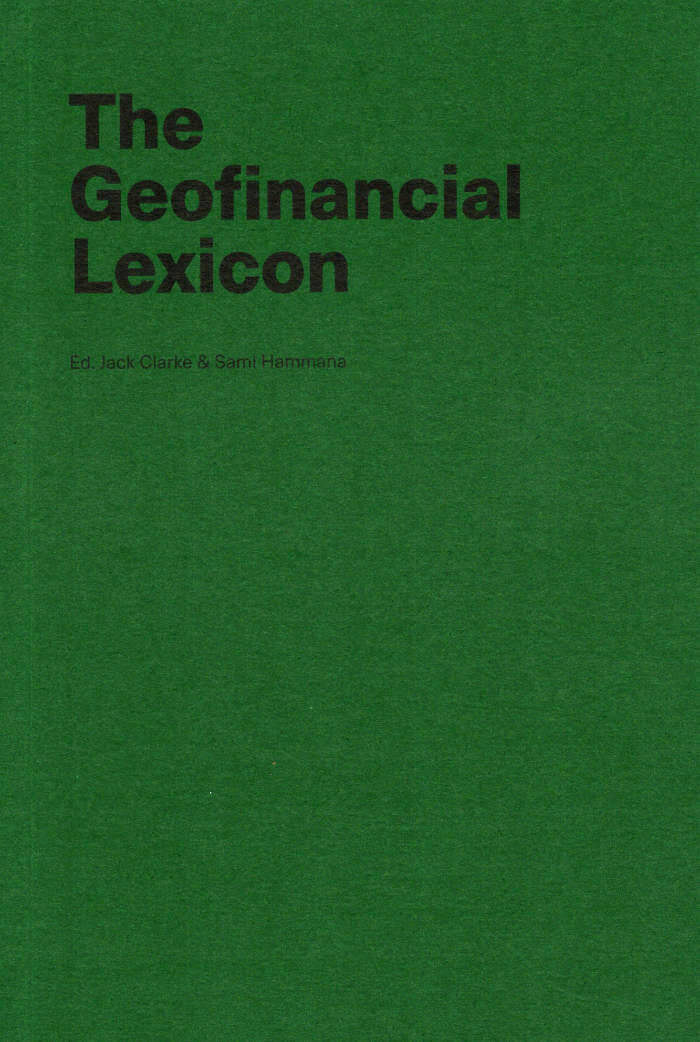
The Geofinancial Lexicon
The concept of a Geofinancial Lexicon emerged in 2016 as a curated subset of the then-canonical financial lexicon compiled and maintained by the Financial Times. The experiment set out to demarcate the possible relationships between the Earth, finance and the anthropocene through the complicitous vocabulary of financial advisors and traders – the Bulls, Bears, Doves and Hawks of ‘high-finance’ and economic policymaking.
This edition, rewritten and recompiled for general release, aims to open this experiment out to the wider-world and provide a generative platform for future investigations, conceptualisations, experiments, languages, actions and collaboration.

Entropia Vol. 1 & 2
Entropia (vol. I & II) – written by William Kherbek and edited in collaboration with Jack Clarke – is a publication which seeks to recount and re-examine a decade of artistic curation, production, and critique between London, Berlin, and other urban art centres from 2010 to 2020.
Comprised of two volumes, this publication contains a compendium of over one hundred reviews and interviews with luminaries of contemporary art (Vol I), as well as a speculative attempt to create a newly generated algorithmic art(ificial) critic (Vol II). Together they serve to document, excoriate, and theorise an art world which is simultaneously hegemonic and precarious, complicit and constructive, driven by values, yet fed by extraction, all filtered through Kherbek’s precise, aphoristic, acerbic, lens.
The publications include contextual contributions from both Josie Thaddeus-Johns, writer for the New York Times, The Financial Times, Frieze; and Rozsa Farkas, director of London-based gallery Arcadia Missa.

Museum of Modern Art, New York
Signals: How Video Transformed the World
Since its debut as a consumer medium in the 1960s, video has shaped our opinions, our politics and our societies. On our phones and computer screens, walls and streets, it defines new spaces and experiences—spreading memes, lies, fervor, fact and fiction. In other words, video has transformed the world.
Featuring works from the collection of the Museum of Modern Art, New York, this illuminating exhibition catalog—MoMA's first major publication on video art in nearly 30 years—explores the ways in which artists have both championed and questioned video's promise, some hoping to create new networks of communication, democratic engagement and public participation, others protesting commercial and state control over information, vision and truth itself.
Lavishly illustrated essays by esteemed scholars and artists—including Ina Blom, Aria Dean, David Joselit, Pamela M. Lee, Glenn Ligon and Ravi Sundaram—highlight video's widely varied formats, contexts and global reach. Signals is a manual for understanding the present, an era in which video has pervaded all aspects of life.

Verlag der Buchhandlung Walther König
Joan Jonas: Moving Off the Land
A multimedia meditation on the many meanings of the ocean across history.
This volume closely follows the development of Joan Jonas' (born 1936) multiformat project Moving off the Land. The artist's most recent body of work, it encompasses three years of research into the significance of the ocean throughout history, and features sculptures, drawings, sound and new video productions. Jonas combines poetry and prose by writers such as Emily Dickinson and Herman Melville with texts by Rachel Carson and Sy Montgomery, and with moving images filmed in aquariums and in Jamaica, where algae bloom and over-fishing pose urgent threats to the ecosystem. The monograph includes the complete script for the performance along with annotations, images of Jonas' live performance, and a complete chronology with documentation of the performance's history.

Kissing Other People or the House of Fame
A book in two halves, Kissing Other People or the House of Fame opens with a sequence of poems that roam the grotty, sublime streets: patting rats, reading pamphlets, enduring labour, acquiring falafel, waving to friends. Then the book flips on a seam and invokes Chaucer as an unlikely guide through a series of dream-blocks, each autonomous yet resonant with attachments and perversions as they come and go, repeat and echo. The book is as staunch as it is warm - one arm extended in a hug and the other cupped over the mouth to shield a secret (weapon).
Kay Gabriel is a poet and essayist. With Andrea Abi-Karam, she co-edited We Want It All: An Anthology of Radical Trans Poetics (Nightboat, 2020). She's the author of A Queen in Bucks County (Nightboat Books, 2022).

Bad Gays: A Homosexual History
An unconventional history of homosexuality.
We all remember Oscar Wilde, but who speaks for Bosie? What about those 'bad gays' whose unexemplary lives reveal more than we might expect? Many popular histories seek to establish homosexual heroes, pioneers, and martyrs but, as Huw Lemmey and Ben Miller argue, the past is filled with queer people whose sexualities and dastardly deeds have been overlooked despite their being informative and instructive.
Based on the hugely popular podcast series of the same name, Bad Gays asks what we can learn about LGBTQ+ history, sexuality and identity through its villains, failures, and baddies. With characters such as the Emperor Hadrian, anthropologist Margaret Mead and notorious gangster Ronnie Kray, the authors tell the story of how the figure of the white gay man was born, and how he failed. They examine a cast of kings, fascist thugs, artists and debauched bon viveurs. Imperial-era figures Lawrence of Arabia and Roger Casement get a look-in, as do FBI boss J. Edgar Hoover, lawyer Roy Cohn, and architect Philip Johnson.
Together these amazing life stories expand and challenge mainstream assumptions about sexual identity: showing that homosexuality itself was an idea that emerged in the nineteenth century, one central to major historical events.
Huw Lemmey is a novelist, artist and critic living in Barcelona. He is the author of three novels: Unknown Language, Red Tory, and Chubz. He has written for the Guardian, Frieze, Tribune, the Architectural Review, New Humanist, the White Review, and L'Uomo Vogue, among others.
Ben Miller is a writer and researcher living in Berlin, where he is currently a Doctoral Fellow at the Graduate School of Global Intellectual History at the Freie Universität. He has written for the New York Times, Literary Hub, Los Angeles Review of Books, Tin House, and Radical History Review, and is the author of The New Queer Photography. Since 2018 he has been a member of the board of directors of the Schwules Museum, one of the world's largest independent queer museums and archives.
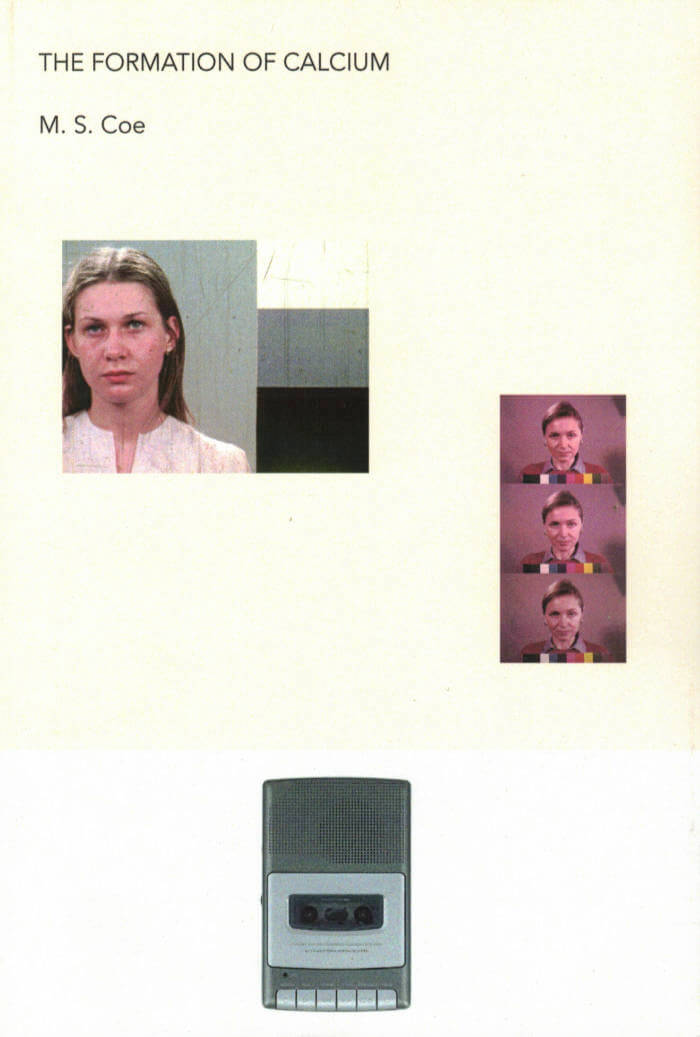
The Formation of Calcium
A horror story of one woman's awful reinvention, M. S. Coe's The Formation of Calcium is disturbingly funny and completely unexpected.
Middle-aged Mary Ellen Washie has finally freed herself of her stultified past life in western New York state and moved to Florida. With the husband she's grown to hate firmly in her rearview mirror, and all ties to her family cut off, she changes her name, bleaches her hair, and befriends Natalie, a seemingly kind, martini-loving woman whom she promptly begins to manipulate. As her machinations propel her beyond the brink of who she used to be, Mary Ellen seeks to unburden herself—but not one to sit down with pen and paper, she narrates the events of her new life into a cassette tape recorder, giving each tape an innocuous name to keep the curious away. A riveting account of one woman's awful reinvention, M. S. Coe's new novel is disturbingly funny and completely unexpected. With elements of pulp noir and confessional literature, The Formation of Calcium depicts the bland misery of modern American life as one woman seeks her own ill-fated transformation.
Born in Las Vegas, Nevada, M. S. Coe is an American writer living in Guadalajara, Mexico. After she graduated with an MFA in creative writing from Cornell University, Clash Books published her first novel, New Veronia, in 2019. Coe's stories have appeared in The Antioch Review, Cosmonauts Avenue, Electric Literature, Nashville Review, Waxwing, and elsewhere. She has held residencies from the Herbert Hoover National Historic Site, Petrified Forest National Park, and Ora Lerman Trust.

The Close Chaplet
Long out of print, The Close Chaplet is Laura Riding's first book, originally published in 1926. Riding deliberately ceased writing poems after 1940, when she came to see poetry as irrevocably flawed as a means of expression. These poems demonstrate Riding's early desire to depart from the close and well-tilled ground of traditional lyric poetry. According to her biographer, Elizabeth Friedman, many of the poems for THE CLOSE CHAPLET were brought in typescript from New York, a few were added in Egypt, and the entire text was carefully edited by Robert Graves.
In his introduction, Mark Jacobs writes that Riding was identifying herself with the pre-moment, the 'what-was-there' before Creation. How did the world, the universe, come to exist, why does it exist, why does it die, why do we? From these questions, Riding begins to develop a theory about the role of women as the origin of all human beings, the only animals with written language. This edition also includes Riding's essay A Prophecy or a Plea, a statement of her poetics initially published in 1926.
Laura Riding was a poet, novelist, short-story writer, essayist, and publisher. While primarily known for the critical works that she co-authored with Robert Graves — A Pamphlet Against Anthologies and A Survey of Modernist Poetry — Riding also left behind an incredibly powerful body of poetry and prose works that, regrettably, remain little read today. These include THE CLOSE CHAPLET (Ugly Duckling Press, 2020), EXPERTS ARE PUZZLED (Ugly Duckling Presse, 2018), CONVALESCENT CONVERSATIONS (Ugly Duckling Presse, 2018), The Lives of Wives, and The Progress of Stories. Famously rejecting poetry early in her career, she spent the last decades of her life co-writing a theoretical work on linguistics, Rational Meaning, with her husband Schuyler Jackson. She was awarded the Bollingen Prize in 1991, the very same year she died.

DEARS No. 5 ever:over
Robert Steinberger, Delphine Chapuis Schmitz and 1 more
DEARS is a print magazine for transversal writing practices at the crossroads of art, poetry and experimental writing. It brings together authors and writers from different backgrounds and constitutes a dedicated platform for texts escaping the usual genres and disciplinary boundaries.
DEARS promotes the exploration of new forms of language as a way to foster new forms of living together, and emphasizes the growing relevance of trans- versal writing practices in this respect.
DEARS no. 5 / Summer 2023 / ever.over
With texts by Diaty Diallo, Douglas Keaney, Dzifa Benson, Sevinç Çalhanoğlu, Jana Vanecek, and an epigraph by Trinh T. Minh-ha.

The Swarm
A shape-shifting, metaphysical thriller where sensorial, sexual, and revolutionary impulses are aligned for the purpose for anarcho-transcendent-communal escape, The Swarm circles around a sundry of anomalous and dead beings who plot their way out of Hungarian fascist rule in the thermal baths of Budapest.
Based in Berlin, Dalia Neis is a writer, filmmaker, and lyricist and vocalist for Dali Muru & The Polyphonic Swarm. Previous publications include Zephyrian Spools: An Essay, a Wind (Knives, Forks & Spoons), and Hercules Road (MA Bibliothèque).

Manimal Woe
Manimal Woe maps the intersection between history and family as few books have. Through poetry, prose, and primary sources, Howe invites us on a journey with the spirit of her father, Civil Rights lawyer and professor Mark DeWolfe Howe, who died suddenly in 1967. The past, both personal and historical, is utterly present, yet just out of reach. From her ancestors' dark legacy as slave traders, to her father's work during the Civil Rights era, to her own interracial marriage and family, Fanny Howe delves deep into the heart of the mysterious and the mystical, and emerges with the questions that so rarely find their way to us.

Return
Through the recurrence of memory, myth, and grief, 回 / Return captures the elusory language of sorrow and solitude that binds Taiwanese diasporic experience.
Rooted in the classical tradition of the Chinese "reversible" poem, 回 / Return is engaged in the act of looking back—toward an imagined homeland and a childhood of suburban longing, through migratory passages, departures, and etymologies, and into the various holes and voids that appear in the telling and retelling of history. The poems ask: What is feeling? What is melancholy? Can language translate either?
A former Margins Fellow at the Asian American Writers' Workshop and the recipient of a Pushcart Prize, Emily Lee Luan is the author of I Watch the Boughs, selected by Gabrielle Calvocoressi for a Poetry Society of America Chapbook Fellowship. Her work has appeared in The Best American Poetry 2021, Best New Poets 2019, American Poetry Review, and elsewhere. She holds an MFA from Rutgers University-Newark.

New Forms of Art and Contagious Mental Illness
Over the years 1919–20, the celebrated medical scientist and doctor Carl Julius Salomonsen began giving public lectures and publishing pamphlets regarding a new “epidemic” that had begun to affect the European populace: the increasing ubiquity of modernist art.
In a 1919 pamphlet titled New Forms of Art and Contagious Mental Illness, he wrote: “We stand, at this moment, before a movement in art which is psychopathic in character, and whose victorious journey through all countries is probably caused by the same spiritual disease that gave the older, religious spiritual epidemic such a powerful spread.” This pamphlet and the accompanying talks were countered by a retaliatory pamphlet published by members of Grønningen, a Copenhagen modernist painters group, to which Salomonsen responded with a further pamphlet.
Translated into English for the first time by literary theorist Andrew Hodgson, the entire altercation is gathered in this book, documenting one of the earliest rejections of modernist art.
Edited & Translated by Andrew Hodgson.

Forlaget Emancipa(t/ss)ionsfrugten
The Order of Release
The Order of Release gathers and comments upon a number of press releases written by artists. The format of the press release came to the author’s attention through her work at an exhibition space where she was writing such texts. In The Order of Release, Brandt explores different ways that artists have used or appropriated the press release as a proper medium or as an active part of the exhibition itself.
A. E. Brandt is based in Paris. Her recent work deals with the circulation and profusion of writing.

Your Love Is Not Good
At an otherwise forgettable party in Los Angeles, a queer Korean American painter spots a woman who instantly controls the room: gorgeous and distant and utterly white, the centre of everyone’s attention. Haunted into adulthood by her Korean father’s abandonment of his family, as well as the spectre of her beguiling, abusive white mother, the painter finds herself caught in a perfect trap. She wants Hanne, or wants to be her, or to sully her, or destroy her, or consume her, or some confusion of all the above. Since she’s an artist, she will use art to get closer to Hanne, beginning a series of paintings with her new muse as model. As for Hanne, what does she want? Her whiteness seems sometimes as cruel as a new sheet of paper.
When the paintings of Hanne become a hit, resulting in the artist’s first sold-out show, she resolves to bring her new muse with her to Berlin, to continue their work, and her seduction. But, just when the painter is on the verge of her long sought-after breakthrough, a petition started by a Black performance artist begins making the rounds in the art community, calling for the boycott of major museums and art galleries for their imperialist and racist practices.
Torn between her desire to support the petition, to be a success, and to possess Hanne, the painter and her reality become more unstable and disorienting, unwilling to cut loose any one of her warring ambitions, yet unable to accommodate them all. Is it any wonder so many artists self-destruct so spectacularly? Is it perhaps just a bit exciting to think she could too?
Your Love Is Not Good stuffs queer explosive into the cracks between identity and aspiration, between desire and art, and revels in the raining debris.
Johanna Hedva is a Korean American writer, artist, and
musician who was raised in Los Angeles by a family of witches, and now lives in LA and Berlin. Hedva is the author of the essay 'Sick Woman Theory', originally published in 2016, which has now been translated into ten languages. Hedva is also the author of the novel On Hell, which was one of Dennis Cooper's favourite books of 2018, and the nonfiction collection Minerva the Miscarriage of the Brain. Their albums are The Sun and the Moon and Black Moon Lilith in Pisces in the 4th House.

Being a Chair. Essays on Choreographic Poetry
Imagine words approaching a dance eyes closed or sleepwalking, words adrift beyond what can be envisioned beforehand, prompting writer and reader alike into a zone where time multiplies, where bodies grow footnotes and paper skin, savour the taste of language, attune their ears to the wavelength of blue. In a string of brief essays on her practice of writing choreographic poetry and scores, Janne-Camilla Lyster offers reflections on time, memory and the senses, on translation, punctuation and rhythm, on mistakes and crevasses, on the impossible and yet other things. What does it take to enter another form of existence, say, a chair?
Janne-Camilla Lyster is a writer, dancer and choreographer. She has published poetry, novels, essays and plays.
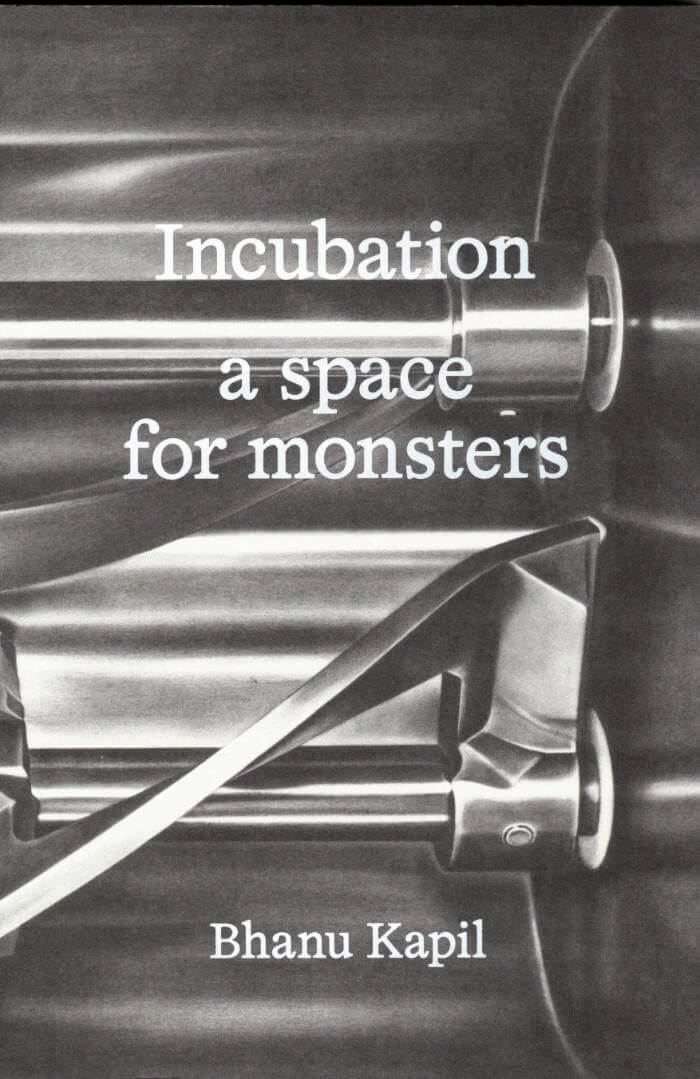
Incubation: a space for monsters
Incubation: a space for monsters is a formally innovative, hybrid-genre book that incorporates poetry and prose. Set in a shifting narrative environment, where human bodies, characters, and text are neither one thing nor another, this fragmentary-diaristic text journeys through the spaces in-between. Originally published in America in 2006 by Leon Works, and out of print for the last seven years, this is the first time this seminal text has been available in the UK.
Following protagonist Laloo – Cyborg, girl, mother, child, immigrant, settler – on a roadtrip through American landscapes, genre styles, and form, Incubation creates radical space for what is ‘monstrous’. Appropriating iconic American tropes, and the structure of Jack Kerouac’s On the Road, Incubation explores the challenges faced by immigrants in attaining such notions of freedom in so hostile an environment. In this fragmentary document there is a celebration in the cobbling together of lives; global in scope, with an intimate focus on interior voice, this landmark text evidences the early innovations and talents of this T.S. Eliot prizewinning author.
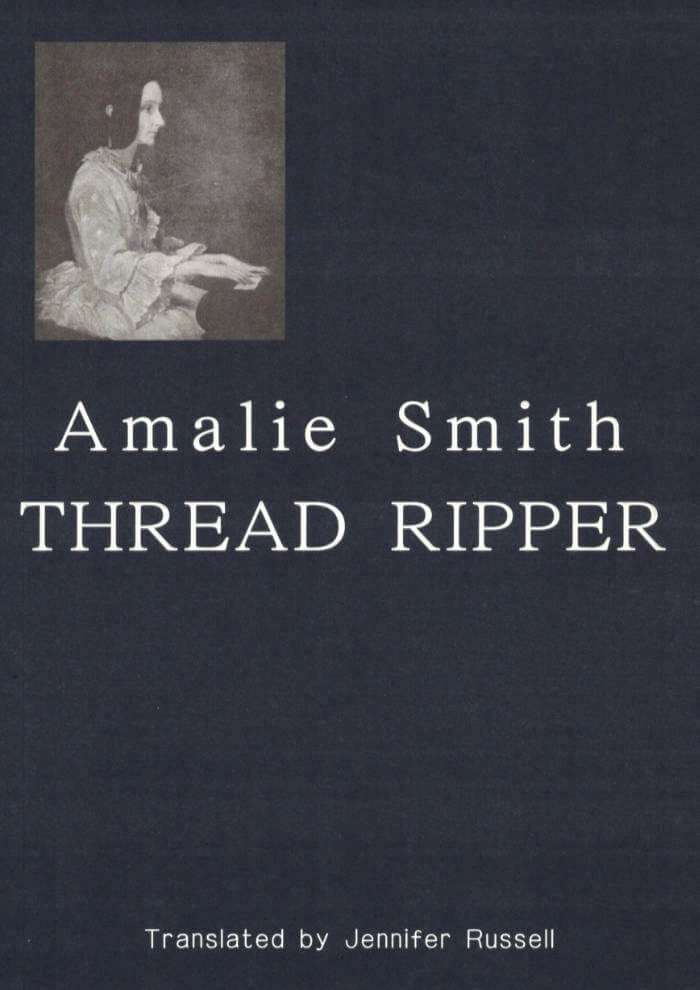
Thread Ripper
An artist in her thirties weaves and unravels connections between the loom and the computer, DNA and technology, dreams and decisions
Thread Ripper is a double-stranded novel about weaving, programming, and pioneering women. A tapestry-weaver in her thirties embarks on her first big commission: a digitally woven tapestry for a public building. As she works, devoting all her waking hours to the commission, she draws engrossing connections between the stuff that life is made from – DNA, plant tissue, algorithms, text, and textile – and that which disrupts it – radiation, pests, entropy, and doubt. In the novel’s second strand, we meet Ada Lovelace, the 1830s mathematician and pioneer of computer programming, and mythical figures such as Penelope, the faithful wife of Odysseus, who wove and unpicked a shroud to put off her 108 suitors.
Contemplative yet clear-sighted, and reviving women’s histories, Amalie Smith’s bracing hybrid of a novel bares the aching interwovenness of art and life.
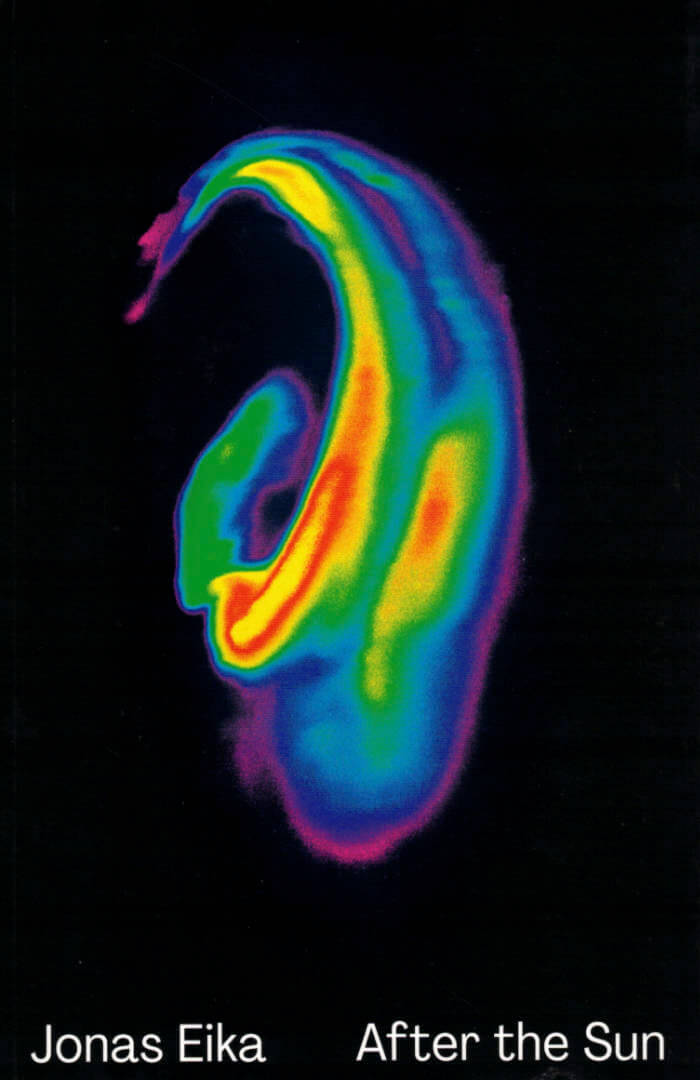
After the Sun
Inventive fiction that probes the tender places where human longings push through the cracks of a breaking world
Under Cancún’s hard blue sky, a beach boy provides a canvas for tourists’ desires, seeing deep into the world’s underbelly. An enigmatic encounter in Copenhagen takes an IT consultant down a rabbit hole of speculation that proves more seductive than sex. The collapse of a love triangle in London leads to a dangerous, hypnotic addiction. In the Nevada desert, a grieving man tries to merge with an unearthly machine.
After the Sun opens portals to our newest realities, haunting the margins of a globalised world that’s both saturated with yearning and brutally transactional. Infused with an irrepressible urgency, Eika’s fiction seems to have conjured these far-flung characters and their encounters in a single breath. Juxtaposing startling beauty with grotesquery, balancing the hyperrealistic with the fantastical, he has invented new modes of storytelling for an era when the old ones no longer suffice.
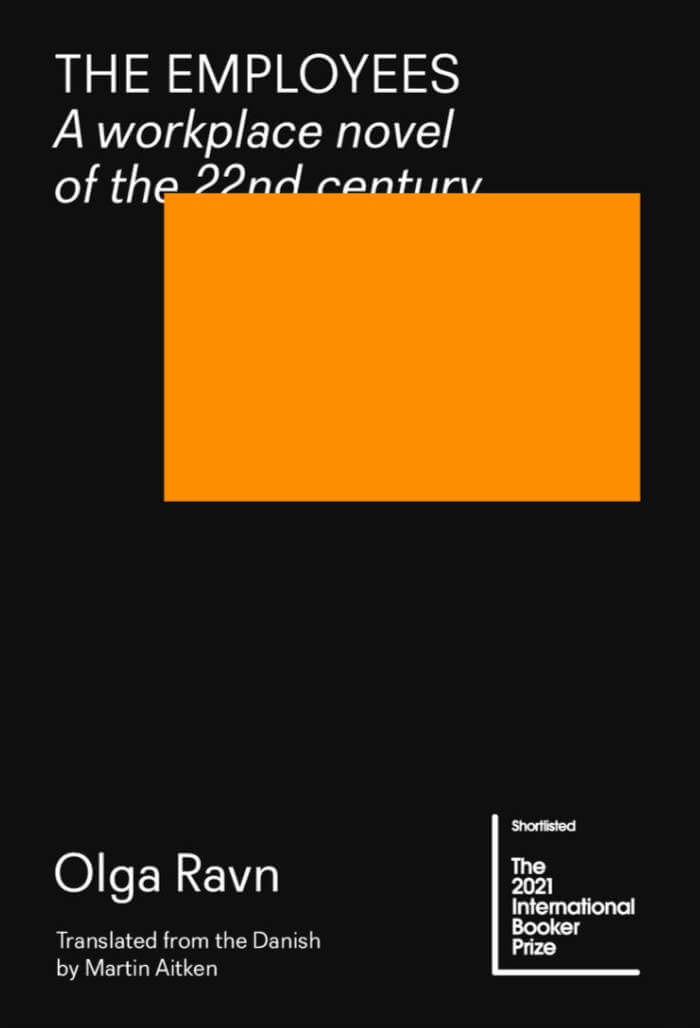
The Employees: A workplace novel of the 22nd century (UK edition)
The crew of the Six-Thousand Ship consists of those who were born, and those who were made. Those who will die, and those who will not. When the ship takes on a number of strange objects from the planet New Discovery, the crew is perplexed to find itself becoming deeply attached to them, and human and humanoid employees alike start aching for the same things: warmth and intimacy. Loved ones who have passed. Shopping and child-rearing. Our shared, far-away Earth, which now only persists in memory.
Gradually, the crew members come to see their work in a new light, and each employee is compelled to ask themselves whether they can carry on as before – and what it means to be truly living.
Structured as a series of witness statements compiled by a workplace commission, Ravn’s crackling prose is as chilling as it is moving, as exhilarating as it is foreboding. Wracked by all kinds of longing, The Employees probes into what it means to be human, while delivering an overdue critique of a life governed by the logic of productivity.
Translated from the Danish by Martin Aitken

Tractatus Philosophico-Poeticus
An exquisite, lyrical reimagining of Wittgenstein’s philosophical work of 1922, from a rising star on par with Inger Christensen
Ludwig Wittgenstein’s Tractatus Logico-Philosophicus, often noted as the most important philosophical work of the 20th century, had a broad goal: to identify the relationship between language and reality, and to define the limits of science.
Following on from Wittgenstein 100 years later, Signe Gjessing updates and reimagines the Tractatus, marrying poetry with philosophy to test the boundaries of reality. Stunning, knowing, and revitalising, and glinting with stars, silk, and ecstasy, this is poetry which exacts the logical consequence of philosophy, while locating beauty and significance in the nonsense of the world.
Translated from the Danish by Denise Newman

Interiors
One day in April the body of Owen Beausoleil, a poet, is found drowned. As the investigation begins, three people find themselves haunted by him – Noah Lang, the medical examiner who performed the autopsy; his wife, Kitty Lang, a psychotherapist; and Lolita Hammershøi, a ballet dancer and Owen’s close friend. As the three of them become bound up in the mystery of what happened to Owen, their lives begin to interweave in both expected, and unexpected ways. Meanwhile, Owen intervenes from the after-life, desperate to find out his fate. Interiors is a about how loss and desire shape our lives, and about what waits beyond the borders of everyday life.Jessie Widner’s debut novel Interiors is poised and poetic, a moving account of what happens to the lost inner lives of the people who leave us, ‘the invisible things that expand within the self … that leave no record’. The mood of the novel, an air of trepidation, stayed with me long after I put it down like a ghostly presence, echoing the novel's own fictional haunting.
Jessica Widner is a writer and academic. Her work has appeared in Extra Teeth, Gutter Magazine, and The Cardiff Review. Interiors is her first novel.

Is There Rush Hour in A Third World Country?
Call centre agents and migrant workers, soldiers and charity workers, fresh university graduates and street children — they all navigate the myriad of avenues in which their desires are entangled within the Philippines’ harsh and unforgiving conditions of migration and labour in Rogelio Braga’s collection of stories, Is There Rush Hour in A Third World Country? Now translated by Kristine Ong Muslim into English, the collection offers a glimpse of the lives of ordinary Filipinos, told amidst coup d’états, active conflict areas, late-night convenience store rendezvous, and bumper-to-bumper Manila traffic, given a considered dignity and nuance by one of the Philippines’ celebrated playwrights.
Rogelio Braga is an exiled playwright, novelist, essayist, and a political activist from the Philippines. They had published two novels, a collection of short stories, and a book of plays before they left the archipelago in 2018, borne of the increasing harassment they faced for their critical stance against the administration of then-President Rodrigo Duterte. Their satirical play against the infamous Marcos family, “Ang Mga Maharlika” was also controversial, drawing ire from supporters of current Philippine president Ferdinand “Bongbong” Marcos Junior. Since 2022, Braga has been granted asylum status by the UK, and remains an active human rights advocate to this day.